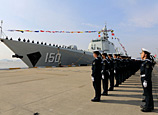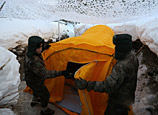
DAMASCUS, Feb. 5 (Xinhua) -- A leading Syrian opposition figure hailed the call by the head of an exiled opposition coalition for a dialogue with the government as "positive and courageous."
In a statement obtained by Xinhua, Hasan Abdul-Azim, the head of the National Coordination Body (NCB), an opposition group based in the country, said the call made by Moaz al-Khatib, the leader of the overseas Syrian National Coalition for Opposition and Revolutionary Forces, is compatible with his own group's vision.
Abdul-Azim contended that the move is applicable on the ground and runs parallel with the international efforts that are being led by international envoy Lakhdar Brahimi.
He said al-Khatib's call is also logical and mirrors his desire and faith in a political solution and his rejection of the government's handling of the crisis.
Last week, al-Khatib announced that he would accept negotiations with the government to end the current stalemate in the Syrian crisis.
While his new stance was snubbed by the Syrian government, Al- Khatib intensified his push for negotiations and urged the Syrian leadership to accept his peace call.
In a recent interview with the Saudi-funded al-Arabiya TV, he voiced readiness to embark on negotiations with the Syrian government and named Vice-President Farouk al-Sharaa as a representative, with whom he would negotiate ways to end the Syrian crisis.
However, the Syrian government has made no response so far, raising speculations that it would turn down the appeal.
Minister of National Reconciliation Ali Haider watered down the appeal while telling the media that Syria could possibly accept it if it's serious and based on the principle of non-violence.
Observers believe that al-Khatib's initiative is impractical as it includes two controversial conditions.
Al-Khatib stipulated that the government should release some 160,000 political detainees, which the government repeatedly refused and contended that the actual number of detainees is way below that figure.
His second condition is that the government extends the passports of Syrians abroad, which the government says it has already done.
The Syrian foreign ministry issued in January instructions to its embassies worldwide to extend the passports of Syrians who are above 30 years old and who hold regular passports for another four years.
Practically, the Syrian leadership has often alluded that any solution to the crisis could not yield fruits unless it has a Russian-U.S. consensus, which will be a political mixture of the political program, outlined by Syrian President Bashar al-Assad in his recent speech, and the Geneva agreement.
The most controversial point is the transitional phase and its interpretation according to each party's perception. The Syrian government insists that this phase should be done under its absolute sponsorship, which is rejected by the opposition.
However, It's likely that the Russians and the Iranians would exert more efforts to lay a foundation for a new meeting of the " Geneva group," which will take into consideration the latest developments, including al-Khatib's initiative and the increasing influence of extremist Islamic groups in Syria.
Still, al-Khatib's initiative does not stand much chance to come true owing to the government's negligence and the attitude of some prominent opposition figures.
George Sabra, the head of the National Syrian Council, said that the Syrian revolution is still capable to withstand and proceed, noting that some parties seek to offer a "consolation prize to the regime."
Some leaders at the Syrian coalition, who are still adamantly rejecting the idea of conducting negotiations with the Syrian government, contended that al-Khatib had probably been subject to pressures, adding that his proposal only reflects a personal attitude. Some others were more adamant and call on him to step down.
Esam Khalil, a Syrian parliamentarian, hoped that the opposition's new approach toward dialogue would be based on a realistic vision and not only a reaction to the failure of the armed rebellion against the government.
He said that the government in Syria can't "seriously consider" al-Khatib's call "unless it expresses an overt and clear stance," namely "rejecting foreign intervention in Syria, denouncing terrorism, hatred and sectarianism as well as preserving the unity and sovereignty of Syria."
















 Entrepreneur takes 48 buses to go home
Entrepreneur takes 48 buses to go home


![]()
